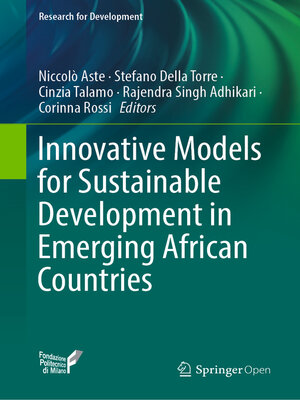Innovative Models for Sustainable Development in Emerging African Countries
ebook ∣ Research for Development
By Niccolò Aste

Sign up to save your library
With an OverDrive account, you can save your favorite libraries for at-a-glance information about availability. Find out more about OverDrive accounts.
Find this title in Libby, the library reading app by OverDrive.



Search for a digital library with this title
Title found at these libraries:
| Library Name | Distance |
|---|---|
| Loading... |
This open access book explores key issues and presents recent case studies in areas of importance for the transition to a circular model of development in emerging African countries that will minimize resource consumption and waste production. The topics covered include the development of sustainable housing models, energy and environmental issues in building design and technical systems, recycling for a sustainable future, models for humanitarian emergencies, and low-cost and web-based digital tools with applications in architecture and archaeology.
The aim is to contribute to a necessary paradigm shift with respect to urban planning and usage of territories, moving from a linear urban metabolism based on the "take, make, dispose" approach to a circular metabolism. Such a change requires a focus on the relationship between the architectural, urban, and physical aspects of new developments, climate, and energy demand, as well as the identification and integration of strategies and infrastructures to achieve a high level of efficiency and self-sufficiency. The book will appeal to all with an interest in sustainable development in the African context.
The aim is to contribute to a necessary paradigm shift with respect to urban planning and usage of territories, moving from a linear urban metabolism based on the "take, make, dispose" approach to a circular metabolism. Such a change requires a focus on the relationship between the architectural, urban, and physical aspects of new developments, climate, and energy demand, as well as the identification and integration of strategies and infrastructures to achieve a high level of efficiency and self-sufficiency. The book will appeal to all with an interest in sustainable development in the African context.







